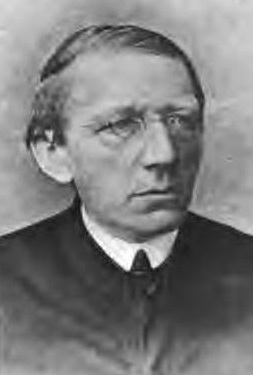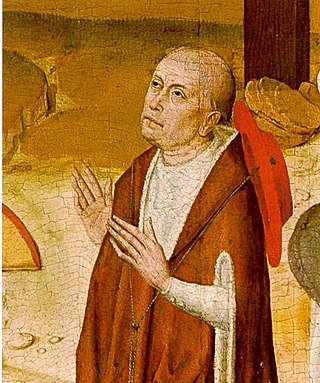Related Research Articles

Franz Heinrich Reusch was an Old Catholic theologian.

Nicholas of Cusa, also referred to as Nicholas of Kues and Nicolaus Cusanus, was a German Catholic cardinal and polymath active as a philosopher, theologian, jurist, mathematician and astronomer. One of the first German proponents of Renaissance humanism, he made spiritual and political contributions in European history. A notable example of this is his mystical or spiritual writings on "learned ignorance," as well as his participation in power struggles between Rome and the German states of the Holy Roman Empire.

Denis the Carthusian (1402–1471), also known as Denys van Leeuwen, Denis Ryckel, Dionysius van Rijkel, Denys le Chartreux, was a Roman Catholic theologian and mystic.

Kaspar Ulenberg was a Catholic convert, theological writer and translator of the Bible.
William Damasus Lindanus or Van der Lindt was a 16th-century Bishop of Roermond and Bishop of Ghent.

Franz Xaver Dieringer was a Catholic theologian. He was a professor of dogma and homiletics at the University of Bonn.
Maximilian van der Sandt, S.J., known as Sandaus or Sandaeus, was a noted Dutch Jesuit theologian.
Tilman Pesch, was a German Jesuit philosopher.

Konrad Martin was a Catholic Bishop of Paderborn.

Anton Hubert Fischer was a Roman Catholic Archbishop of Cologne and cardinal.
Heinrich Klee was a German theologian and Biblical exegete who argued against liberal and Rationalist currents in Catholic thought.
Franz Jacob Clemens was a German Catholic philosopher, a layman who defended the Catholic Church even on theological questions.
Joseph Wilhelm Karl Kleutgen was a German Jesuit theologian and philosopher. He was a member of the Society of Jesus, and contributed significantly to the establishment of Neo-scholasticism.

Franz Hettinger was a German Catholic theologian.
Alfonso Muzzarelli was an Italian Jesuit theologian and scholar.
Catholic dogmatic theology can be defined as "a special branch of theology, the object of which is to present a scientific and connected view of the accepted doctrines of the Christian faith."

Albert Pighius (Pigghe) was a Dutch Roman Catholic theologian, mathematician, and astronomer.
John Gibbons SJ was an English Jesuit theologian and controversialist.

Aloys Grillmeier was a German Jesuit priest, theologian and cardinal-deacon of the Catholic Church. Pope John Paul II created him cardinal-deacon of San Nicola in Carcere on 26 November 1994.

Bruno Wüstenberg was a German prelate of the Catholic Church who spent his career in the diplomatic service of the Holy See.
References
- ↑ nl:Exaten
- 1 2 Scheid, Nikolaus (1912). . Catholic Encyclopedia . Vol. 15.
- Attribution
 This article incorporates text from a publication now in the public domain : Scheid, Nikolaus (1912). "Wilhelm Wilmers". Catholic Encyclopedia . Vol. 15., the entry cites:
This article incorporates text from a publication now in the public domain : Scheid, Nikolaus (1912). "Wilhelm Wilmers". Catholic Encyclopedia . Vol. 15., the entry cites: - Tholen, Menologium oder Lebensbilder aus der Gesch. der deutschen Ordensprovinz (Roermond, 1891), printed for private circulation.